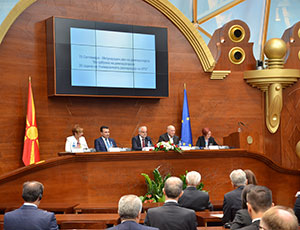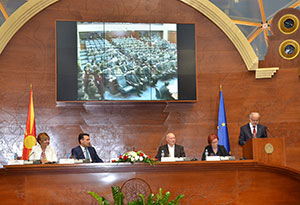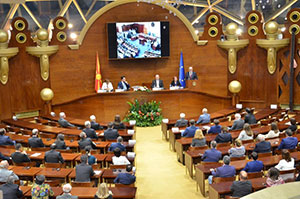 Friday, 15 September 2017
Friday, 15 September 2017
Address of the President Xhaferi on the Occasion of the International Day of Democracy
Distinguished Prime Minister of the Republic of Macedonia, Mr. Zoran Zaev,
Distinguished First President of the Assembly of the Republic of Macedonia, Mr. Stojan Andov,
Distinguished colleagues, current and former MPs, Excellences,
Distinguished attendees,
Ladies and gentlemen,
The thoughts for democracy as form of governance and form of state order can be found in the ancient times of Aristotle, Socrates and Plato. Essentially, since ancient times, democracy and everything in the context thereof, was a subject of theoretical debates of political definitions. Since today, majority of us here, are people from the politics, I shall quote one of those political definitions “Democracy is the worst form of governance, except for all the others”. I believe that many of you recognized the quote of one of the biggest politicians of the last century, Sir. Winston Churchill. Perhaps the fact that there is no better form of governance was the motive for the principles of democracy to be embedded in the United Nations Chapter, as well as in many other documents and associations. On this day, 20 years ago, in Cairo, the Interparliamentary Council adopted the universal Declaration of Democracy of the Interparliamentary Union. On this day, ten years ago, the United Nations proclaimed 15 September as International Day of Democracy.
In June I have sent a letter to the Secretary General of IPU that contained the information that the Assembly of the Republic of Macedonia shall organize an event on 15 September 2017, in the framework of which the “Common Principles for Support to Parliaments” shall be accepted, so today, with great pleasure, as Assembly of the Republic of Macedonia and as current President of the Assembly to host this significant event for the democracy and the parliamentarism in general, especially for a young democracy as ours.
What is the aim or the ideal of democracy? I shall refer to the already mentioned Universal Declaration, and Article 3 thereof that reads “As an ideal, democracy aims essentially to preserve and promote the dignity and fundamental rights of the individual, to achieve social justice, foster the economic and social development of the community, strengthen the cohesion of society and enhance national tranquillity, as well as to create a climate that is favourable for international peace. As a form of government, democracy is the best way of achieving these objectives; it is also the only political system that has the capacity for self-correction” – end of quote.
Naturally, the question that implies is how to achieve these ideals? The human rights and freedoms and their proper respect are the fundamental principle on which we can practice the true democracy. Furthermore, without free and fair elections, on providing the citizens through free and secret voting to select their representatives, we cannot speak of democracy. With this, we reach the so-called political rights that also include the political organization into parties, and certainly the right of each individual to elect and to be elected, and the free and transparent presentation of opinions to be provided in the parliaments. Who should do this? The answer is very simple, the Parliament, being of key importance for protecting of the democracy and the rule of law, the respect of human rights, equal opportunities, as well as economic and social growth. Namely, through its legislative oversight and representative function, the parliaments bear responsibility from the time of ancient “Agora” to the current, contemporary parliaments constantly grows. Hence, at the today’s modern world the Parliaments are of vital importance for all citizens.
 Certainly, the state has to provide implementation and practice of the human political, economic and social rights for all its citizens. That is why, without honest and transparent government freely elected and accountable of its governance with the public affairs, one cannot speak of democracy. All this requires institutions and highly professional and independent state administration. At the same time, the institutions in the democratic processes, especially the heterogeneous pluralistic societies as ours, through inclusion of people must ensure diversity and pluralism, regardless of the ethnic, religious or any other characteristic.
Certainly, the state has to provide implementation and practice of the human political, economic and social rights for all its citizens. That is why, without honest and transparent government freely elected and accountable of its governance with the public affairs, one cannot speak of democracy. All this requires institutions and highly professional and independent state administration. At the same time, the institutions in the democratic processes, especially the heterogeneous pluralistic societies as ours, through inclusion of people must ensure diversity and pluralism, regardless of the ethnic, religious or any other characteristic.
Ladies and gentlemen,
Here I would like to underline the role of the NGO sector, i.e. the civil society. Namely, the civil society, through the NGOs mobilizes greater number of people who wish to participate on the creation and enforcement of the policies that incorporate their interests. Furthermore, the NGOs themselves, are more mobile and do not have the classicalparty organization, which in the not sufficiently developed societies suffocates the initiativeness, and if you will, creativity of the members, on the account of the alienated political elites. In the same time, the civil society of the modern and highly developed democracies, becomes very serious and efficient guardian of the human rights and freedoms, and in the same time a corrector to the practices in the governance of the political elites.
It is natural, when marking 20 years from the adoption of the Universal Declaration by IPU and marking International Day of Democracy, to ask ourselves how far we have reached with the democracy in our society. What is the level of our parliamentarism, and how much do we indeed have a true legal state and rule of law, and in this framework, above all, respect of the fundamental human rights and freedoms. Where is our NGO sector?
There is no single answer to all these questions. Nevertheless we can provide a common denominator that we still suffer from infant diseases of the parliamentary democracy. I am personally encouraged by the fact that we can openly and with arguments discuss and criticize our reality. It demonstrates that in the past 26 years of independence, a political system which sees its weaknesses and if you would, inconsistencies and knows self – correction was created. It is a fact that in these processes of correction we are assisted by our international friends, thus, allow me to seize this opportunity, as first among the equal and President of the Assembly, to express appreciation to all international organizations and associations that actively participated and participate in the further development of the democracy and the parliamentarism of the Republic of Macedonia. With this I believe that we are on a correct path to fulfil our strategic determinations – membership in EU and NATO.
 Finally, I would like to underline that he current parliamentary majority has clearly expressed the political will to more dynamically continue the development of democracy, true rule of law, and functioning of the legal state, strengthening the role of the Assembly, but also the accountability of the parliamentary majority as well as the opposition. Namely, the fact that in the absence of strong and effective democratic parliament, the state loses its legitimacy remains. Even more important is the fact that these determinations and efforts are clearly recognized and supported by the citizens. Let us not forget that the democracy, since ancient times, is a process that is being upgraded and developed. This task and responsibility is ours, we, who in this social moment are in the politics, but, the responsibility is in the NGO sector and all citizens.
Finally, I would like to underline that he current parliamentary majority has clearly expressed the political will to more dynamically continue the development of democracy, true rule of law, and functioning of the legal state, strengthening the role of the Assembly, but also the accountability of the parliamentary majority as well as the opposition. Namely, the fact that in the absence of strong and effective democratic parliament, the state loses its legitimacy remains. Even more important is the fact that these determinations and efforts are clearly recognized and supported by the citizens. Let us not forget that the democracy, since ancient times, is a process that is being upgraded and developed. This task and responsibility is ours, we, who in this social moment are in the politics, but, the responsibility is in the NGO sector and all citizens.